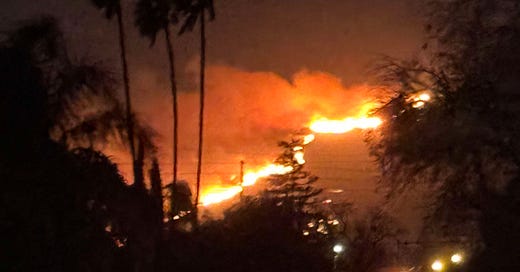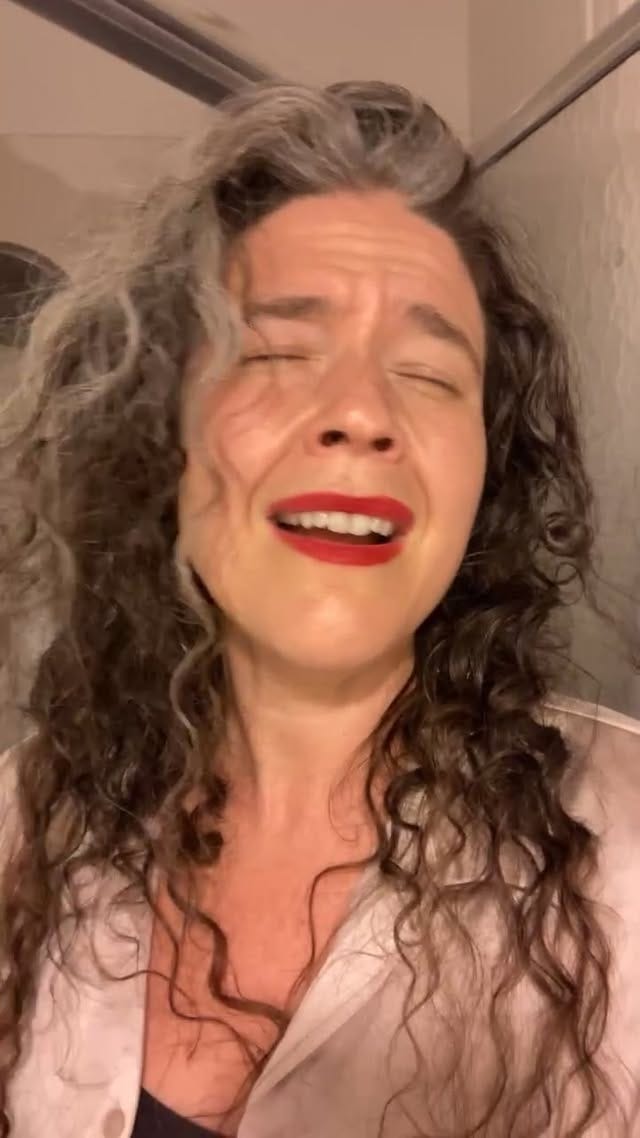New Year, new visions (amidst the pillars of smoke)
Locating hopeful horizons when the world is – literally – on fire
Dear Soulful Revolutionaries,
I was planning to write a simple reflection on Vision today — my first essay in a series on Planning our Way (Strategically!) Toward Nonviolent Social Change. Then, like many of you, I awoke this morning to messages and social media from friends fleeing from the fires that are blazing through neighborhoods across Los Angeles County, from the mountains to the coast.
At the time of this writing (Wednesday midday), the Eaton Canyon and Palisades fires are at 0% containment. LA’s infamous Santa Ana winds are expected to continue wreaking havoc on landscapes rendered dangerously dry by climate change.
These fires feel intensely personal. For nearly a decade I lived in Los Angeles, including several years in Pasadena, where one of the biggest fires is raging. In the face of all of this bad news, I am first and foremost heartbroken, then anxious, and then angry.
I am grieving the catastrophic losses so many beloveds are facing. I personally know at least two families who have lost their homes. One of those was a second home to me when I babysat for the family during seminary. The church that raised me up for ordination is an evacuation center, while a neighboring Episcopal Church burned to the ground. I am anxious for the dozens of folks I know have evacuated, not knowing whether they will have a home to which to return.
And I am angry at the people who have chosen power and profit over people. Just to mention a few:
those have invested in police instead of fire departments,
those who have scrapped progressive climate legislation in favor of get-rich-quick deregulation,
those who have built leaky pipelines through indigenous lands despite mass protest against them,
and those continue to support dropping undeniably climate-altering tonnage of bombs on Palestine.
This is a collective trauma: life in Pasadena, the Palisades, and greater LA County will never be the same.
In a call to action catalyzed by these catastrophic conditions, Joshua Hill wrote yesterday:
“no one is coming to save us from this malevolent politics that insists we accept a torrent of fires and floods.”
Hill goes on to say that we need to organize ourselves to resist the death-dealing marriage of exploitative capitalism and fear-based politics. We can and must build the power to push back against the oligarchs and Oil Barons who are killing our planet.
I wholeheartedly agree.
Still, strategically organizing for change can feel like a nonstarter when the conditions we are living in can so easily lead us to despair. It’s absolutely apocalyptic out there. If we’re going to collectively act for change, we’re going to need a pretty damn compelling vision of tomorrow to inspire us to show up.
So, perhaps an appropriate place to begin this refracted reflection on vision is with a question:
How do we see through the smoke to a new horizon?
When any possibility of a hopeful future is obscured by so many thick, choking layers of systemic oppression, this is a profoundly spiritual question.
By “spiritual,” I don’t mean seeking some pie-in-sky means of opting out of our catastrophic context. I mean exercising our imaginations to consider new possibilities, or what Zen master and Indigenous Hawaiian leader Norma Kaweloku Wong calls “horizons.”
In her new book, When No Thing Works, Wong says that crisis is a “critical juncture when and where change begins.” We have to be honest, she insists, about the extent of the polycrisis we are collectively experiencing. The situation really is dire. Until we can face this, we will not be able to imagine the scale and depth of change required in order for our species survive, let alone flourish. In the absence of an honest accounting of the vastness of the destruction humans have unleashed on this planet, considering hopeful horizons will be an exercise in futility. Our visions will fail pitifully in meeting the moment.
So we have to name reality — what is happening and how we got here — but we can’t be consumed by it. As the proverb goes,
Where there is no vision, the people perish.
It is a worthwhile practice to take a breath when the dread rises, to remember that those who benefit from the status quo want us to feel despair. Holding onto a hopeful horizon is a powerful form of resistance.
As Abigail Bengson brilliantly sings:
Despair is a tool of empire. If they exhaust us, they can keep us down. If you feel hopeless, that's on purpose. You better look around at all the love that has been poured into us, that got us this far. The love of every ancestor and the light of every star.
Simply sitting in the smoke of the crisis will suffocate our spirits, killing us before the flames do. With deaths of despair continuing to rise in the US, it is clear that horizons are as existentially necessary as they are strategically imperative.
If we are to strategize and then act for a freer, more just, and gentler world than the one we are inhabiting right now, Wong asserts that we need both near horizons (considering the second half of our lives, if we are young, or the lives of our children or grandchildren) and far ones (which she sets seven generations out, or 160 years hence). We need to imagine what is worth living for — even if it doesn’t unfold in our lifetime. And we need this horizon to be as concrete, tangible, and embodied as possible.
Horizons shape the arc of our movements, giving form to how we will act. For example, if the horizon we are heading toward is one where no one is hungry, and everyone is able to eat healthy, nourishing, locally grown food, free of pesticides and genetic modifications, then our strategy might involve guerrilla urban gardening campaigns or teach-ins to help people learn to propagate plants and harvest seeds from their own backyards.
Imagining the beautiful horizons that will unfurl when things go right is vital, life-preserving work. Imagination is one of our greatest weapons against the violence of empire. Imagination is a muscle we exercise in service of hope.
Ashtin Berry puts it like this:
This imaginative work begins inside each of us, like a seed planted in our spirit. But it can only grow to fruition in community — each of our seeds growing within a garden of future possibility. We nurture these tender plants together.
Cultivate vision in communal conversation
Concretely, here are a couple of tools you might find helpful as you consider hopeful horizons within yourself and in your community. Both are about talking to our neighbors — a practice that feels increasingly essential.
For my friend DeAmon Harges, aka the Roving Listener of Indianapolis, developing a shared vision of flourishing boils down to asking your neighbors three questions:
What is something you are good enough at that you could teach someone else?
What do you want to learn?
Who besides God (and yourself) walks with you on your journey?
These questions invite people to express their longing (something many folks are seldom asked to do, beyond yearning for stuff to consume), to imagine themselves contributing something to the future that will be collectively built, and to situate themselves within a concrete community.
Or consider this wisdom from Srdja Popovic. A student leader of the Otpor movement that nonviolently overthrew Serbia’s dictator Slobodan Milošević in 2000, he now teaches people around the world how to build nonviolent revolutionary movements. Popovic says:1
“it’s imperative you know what people cherish” because, “it’s the mundane things that move people.”
In Popovic’s civil resistance trainings, people consistently speak not of “big things” like “civil rights, or freedom of religion, or the right to assemble.” They “talk about the little things: they want respect and dignity, they want their families to be safe, and they want honest pay for honest work.”
We don’t get to a shared horizon — or what Popovic calls a “vision of tomorrow” — by assuming that we all prioritize the same values. We learn what people cherish by listening to them. And then, together, we can begin to construct a beautiful vision of what a collective future would entail.
In this spirit, I would love to hear about the horizons you are looking toward.
For my part, I’m choosing to be guided this year by the word grit. (It’s actually my “Star Word” this Epiphany season — illuminating my way, reflecting my values and priorities as I go). On my horizon is being close to the Earth, tough yet humble. I intend to practice this through time outside, getting messy in the dirt with my children, and participating in protest actions rooted in contending for the humus/earthiness of all of us.
I wonder: What vision are you bringing to this new year? How are you holding onto hope amidst the smoke of despair? And how are you hoping to imagine new horizons with others?
in his hilarious, engaging book with the longest subtitle ever: Blueprint for Revolution: How to Use Rice Pudding, Lego Men, and Other Nonviolent Techniques to Galvanize Communities, Overthrow Dictators, or Simply Change the World








My focus this year in my parish community and my racial justice ministry is building community. Connecting to what Popovic said, what are the daily, mundane yet intimate ties that bind us together? My call focuses on gathering us together and creating safe spaces to share and spaces for imagination and hope. Through the Gospels, Jesus guides us on how to live and be in the world. Our hope comes in knowing that Jesus continues to walk before us, beside us, behind us and next to us. Jesus and the Holy Spirit guide us through the smoke and hurricanes, invisible wires laid to cage us within the framework of our society and the unimaginable hurt of losses. When we focus on community, we can embrace and love one another the way Jesus, the Holy Spirit and God love us -- Wholly for the benefit of all. It is not about you or me but about us. We cannot heal without one another.
What a beautiful, hopeful piece. Thank you for sharing ❤️